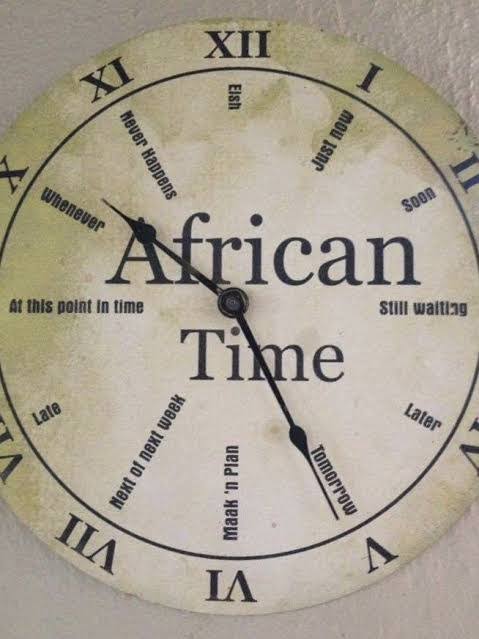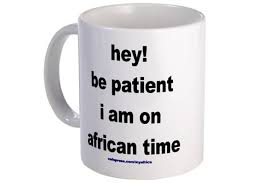OPINION: Why 'African Time' Is More Harmful Than We Think

NTRODUCTION: More Than Just Being Late
In many African countries, the phrase “African Time” is tossed around with a smile, a shrug, or even a playful excuse. It refers to the widely accepted habit of arriving late, sometimes minutes, even hours, to events, meetings, or appointments. Whether it’s a wedding that starts three hours after the printed time or a business meeting delayed because “people are still on the way,” African Time has been normalized to the point of becoming a cultural quirk.
But beneath the humor lies a deeper problem. This casual acceptance of lateness isn’t just about flexible schedules, it has tangible consequences for productivity, erodes trust in personal and professional relationships, and reinforces stereotypes that undermine Africa’s global image. In a world where time is often equated with value and efficiency, African Time risks becoming more than just an inside joke; it becomes a silent saboteur of economic growth and societal progress.
If Africa aspires to compete on the world stage, the perception and practice of time management must shift from a cultural punchline to a cornerstone of responsibility and respect.
A Cultural Habit with Colonial Roots
The phrase “African Time” may sound like a homegrown joke, but its roots are tangled in history and not entirely of Africa’s making. While communities across the continent have long had their own ways of marking time, these were often event-based rather than clock-based. In many pre-colonial societies, time was measured by natural rhythms the position of the sun, the crow of a rooster, the end of a task, rather than by the rigid tick of a mechanical clock. Life moved according to communal needs, not the demands of a wristwatch.

Photo Credit: Zikoko
The shift came with colonialism. European administrators, soldiers, and missionaries imposed a clock-driven culture tied to industrial schedules, railway timetables, and bureaucratic systems. Africans failed to adhere to these strict timelines because their daily lives had never required it, Over generations, this narrative was internalized, subtly reinforced in workplaces, politics, and even social settings.
What began as a clash between two different perceptions of time gradually evolved into a normalized behavior, wrapped in humor but rooted in a deeper historical wound. Today, “African Time” isn’t just about being late; it’s a legacy of cultural adaptation and sometimes resistance that has yet to fully reconcile with the demands of a globalized, clock-conscious world.
The Economic Cost of Lateness
Lateness is more than an inconvenience in the modern economy, it is a currency drain. Every delayed meeting, missed deadline, or late arrival chips away at trust, efficiency, and opportunity. In business, time isn’t just money; it is credibility. When a deal hinges on punctuality, showing up late can mean showing you’re not ready for serious partnership.

Photo Credit: The Cable
Social Insight
Navigate the Rhythms of African Communities
Bold Conversations. Real Impact. True Narratives.
Across African cities, stories abound of promising contracts lost because a client, investor, or partner was kept waiting. It has been revealed that poor time management is one of the reasons investors hesitates to work with certain local businesses. In global trade negotiations, where schedules are tightly choreographed, a single missed meeting slot can mean waiting weeks or months for the next chance.
The ripple effect is costly. Lateness slows down decision-making, breeds inefficiency in teams, and signals unreliability to foreign partners. In economies where global competition is fierce, it’s a habit Africa can no longer afford — not when the rest of the world is running on the minute hand.
Lateness in Leadership and Governance
Though often dismissed as a quirky byproduct of cultural flexibility, “African Time” has seeped into the corridors of power—sowing doubt and undermining systems designed to serve the public.
In many African countries, political events, from press conferences to policy rollouts, are habitually delayed. Ceremonies begin well behind schedule, and project deadlines stretch into uncharted months or years. These delays are more than logistical frustrations, they are potent symbols of ineffective governance.
Across Africa trust in key state institutions, including the president, parliament, courts, and police, has dropped to an average of just 47%, according to Afrobarometer. Citizens cite inefficiency, broken promises, and a lack of accountability—hallmarks of governance slowed down by poor timekeeping
These statistics show that when officials treat time casually, it becomes an institutional flaw, eroding citizens’ faith in their leaders. it's not just elections and public events that succumb to “African Time.” Delays in judicial processes, from court case backlogs in Kenya to outpatient wait times of several hours in South African clinics illustrate how time mismanagement cripples essential services. Meanwhile, postponed elections under flimsy pretexts, like Nigeria’s 2019 postponement citing security concerns, fuel cynicism, as citizens interpret these delays as politically calculated rather than genuine logistical obstacles
At its root, habitual tardiness in leadership signals a lack of respect for the public’s time and a deeper misalignment with the responsibilities of office. It's not just about punctuality—it’s about preserving trust, demonstrating competence, and honoring the social contract between citizens and their leaders.
Social Consequences: Weddings, Funerals, and Everyday Life
In much of Africa, “African Time” doesn’t just linger in offices or politics, it spills into the most intimate corners of life. Weddings scheduled for 2 p.m. rarely begin before sunset; funerals may stretch late into the night, not because of grief’s unpredictability, but because guests and hosts alike have individually agreed that the announced time is merely a suggestion.
What might seem like harmless flexibility carries subtle consequences. Friends arrive late to avoid “waiting too long,” reinforcing a cycle where events never start on time. Community meetings stall until “everyone gets here,” eroding efficiency and undervaluing the time of those who arrived punctually. Even in family life, the habit can fray trust, when punctuality becomes optional, so does the reliability of one’s word.
While this tolerance for delay is sometimes framed as a relaxed, communal rhythm, it can also chip away at mutual respect and strain relationships.
Social Insight
Navigate the Rhythms of African Communities
Bold Conversations. Real Impact. True Narratives.
The Global Perception Problem
In the age of instant communication and interconnected markets, timekeeping is more than a courtesy, it’s a currency of trust. Yet “African Time” often sends the wrong message to the rest of the world. When meetings start late, deadlines are flexible, and schedules bend without apology, international partners may read it as a lack of discipline or seriousness.
These perceptions, though sometimes unfair, are powerful. They can reinforce harmful stereotypes of inefficiency and unreliability, making it harder for African professionals and businesses to compete on equal footing. Investors might hesitate, collaborations may falter, and opportunities can quietly slip away not because of a lack of skill or innovation, but because punctuality is seen as a non-negotiable marker of professionalism in global markets.
In a competitive world where time is literally money, even the smallest delays can ripple outward, costing not just individual reputations but the collective image of African enterprise. Changing this narrative requires more than defending cultural flexibility; it demands showing, through action, that African talent can deliver not only quality but precision.
Breaking the Cycle
If “African Time” is a learned habit, then it can also be unlearned, but it will take a cultural shift backed by practical action. Change starts with education. Schools can treat time management not as a footnote in civics lessons, but as a core life skill, teaching children that punctuality is not just politeness, but a professional advantage.
Corporations, too, have a role to play. Enforcing strict start and end times for meetings, tying punctuality to performance reviews, and rewarding timeliness can send a clear message: time is valued, and wasting it has consequences. Government institutions could lead by example, ensuring public services and events run on schedule, signalling that lateness is no longer the accepted norm.
Beyond policy, cultural influencers from celebrities to social media creators can reshape the narrative. When people with large followings treat punctuality as aspirational, it stops feeling like an imposed discipline and starts looking like a lifestyle upgrade. The goal isn’t to erase cultural flexibility, but to balance it with a respect for time that matches Africa’s ambition on the world stage.
Conclusion: Time Is Wealth
Time is more than the ticking of a clock, it’s a currency we all spend, whether we realise it or not. In business, in education, in governance, every lost minute compounds into missed opportunities and diminished potential. Punctuality, then, isn’t about mimicking “Western” habits; it’s about reclaiming ownership of Africa’s future.
When we show up on time, we send a silent but powerful message: we value ourselves, we value others, and we are ready to compete on any stage. Every second saved is an investment, in trust, in efficiency, in credibility. And in a world where perception can shape opportunity, mastering time may be one of the most radical, transformative acts Africa can choose.
It’s not just about keeping the clock; it’s about keeping our promise to ourselves.
Recommended Articles
Crypto World Buzzes: Yellow Card Enlists Psycho YP as Brand Face

Yellow Card Financial, Africa's rapidly growing crypto exchange, has partnered with Nigerian artist Psycho YP as its new...
E-commerce Giant Jumia Reports Stellar 13% Revenue Surge to $188.9 Million, Driven by Nigerian Market

Africa's e-commerce leader, Jumia Technologies AG, reported a 13% revenue surge in 2025, driven by strong GMV and increa...
Jumia's Bold Exit: Algeria Operations Halted for Profitability Push
Jumia exited Algeria in February 2026, part of a strategy to streamline operations and focus on profitable markets amids...
Africa's Next Big Bet: Tapping into the $12 Billion Decentralized Prediction Market

The global Decentralised Prediction Market (DPM) sector has seen a massive surge, yet Africa, despite its high crypto ad...
Bitcoin Philanthropy: Paxful Co-founder Ray Youssef Funds 100 Nigerian Schools

Ray Youssef, co-founder of Paxful and Built With Bitcoin, discusses the transformative power of peer-to-peer Bitcoin ado...
Microsoft and Women in Tech SA Launch Massive AI Training Initiative Across Africa

The ElevateHer AI programme, a collaboration between Women in Tech South Africa, Absa Group, and Microsoft Elevate, is e...
You may also like...
Bundesliga's New Nigerian Star Shines: Ogundu's Explosive Augsburg Debut!

Nigerian players experienced a weekend of mixed results in the German Bundesliga's 23rd match day. Uchenna Ogundu enjoye...
Capello Unleashes Juventus' Secret Weapon Against Osimhen in UCL Showdown!

Juventus faces an uphill battle against Galatasaray in the UEFA Champions League Round of 16 second leg, needing to over...
Berlinale Shocker: 'Yellow Letters' Takes Golden Bear, 'AnyMart' Director Debuts!

The Berlin Film Festival honored
Shocking Trend: Sudan's 'Lion Cubs' – Child Soldiers Going Viral on TikTok

A joint investigation reveals that child soldiers, dubbed 'lion cubs,' have become viral sensations on TikTok and other ...
Gregory Maqoma's 'Genesis': A Powerful Artistic Call for Healing in South Africa

Gregory Maqoma's new dance-opera, "Genesis: The Beginning and End of Time," has premiered in Cape Town, offering a capti...
Massive Rivian 2026.03 Update Boosts R1 Performance and Utility!

Rivian's latest software update, 2026.03, brings substantial enhancements to its R1S SUV and R1T pickup, broadening perf...
Bitcoin's Dire 29% Drop: VanEck Signals Seller Exhaustion Amid Market Carnage!

Bitcoin has suffered a sharp 29% price drop, but a VanEck report suggests seller exhaustion and a potential market botto...
Crypto Titans Shake-Up: Ripple & Deutsche Bank Partner, XRP Dips, CZ's UAE Bitcoin Mining Role Revealed!

Deutsche Bank is set to adopt Ripple's technology for faster, cheaper cross-border payments, marking a significant insti...
